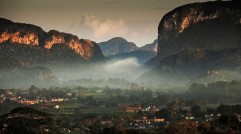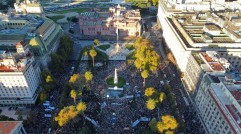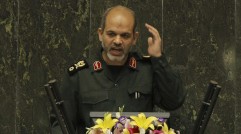Afro-Latino Festival 2015: Que Bajo?!, Les Nubians, Cultura Profética and Los Hacheros Share Importance of Diversity in Music
In its third year, the Afro-Latino Festival pulsed with vibrant, melodic sounds that can be found throughout Latin America and mapped back to "the motherland." Beyond food, language and history, there's no better way to trace culture ties than with music.
The Que Bajo?! Rio Bamba DJ Set, hosted by DJs and producers Geko Jones and Uproot Andy, helped to kick-off the musical portion of the Afro-Latino Festival this past Saturday. While there, the duo employed the folkloric music of Latin America, set it to the tune of modern electronic and served it to hungry audiences who were eager to dance and observe the DJ's interpretation on Afro-Latino culture.
"We came together to throw this party because we felt like there is so much music coming from Latin America diaspora that doesn't get represented in New York nightlife. It's pretty much get dominated by reggaeton, salsa and the classic stuff," DJ Uproot Andy told Latin Post. "The point of Que Bajo?! is to open up a space to play what we enjoy, what isn't represented, and that speaks to the places that people that live in New York actually come from. Not all of the Latinos in New York are Puerto Rican. Also, music is something that's not tied down to traditional ideas of identity. I'm not Latino, but living here I've become really involved in Latino culture. We've always used music to complicate the ideas of identity; also, to bring people together."
DJ Geko Jones explained to Latin Post that the Afro-Latino Festival is important because Afro-Latinos have it harder than the Latino population at large, and Afro-Latinos "contribute to the structure of societies all across Latin America and other countries the same way that Mexicans or other people of color in the United States do. If you were to take all of those people out, cities would fall apart. When it comes to music especially, that's extremely true as well." He explained the profound musical contribution of Afro-Latino artists in the foreground and the background, and said that creating more spaces like the Afro-Latino Festival promotes visibility.
"When you listen to my mix tapes, you hear mashups, and it's about bringing two divergent things together that don't necessarily go together, as a means of creating something that's palatable to wider audience," said DJ Geko Jones. "You put a hip-hop or house beat with something that's traditional and all of sudden they're willing to dance to it at that the club. Sometimes people look at you funny if you play some random old tune from 40 years ago, so what we do is use the root, the essences and all that goodness, and bring it to a younger audience."
Que Bajo?! welcomed Colombian traditional folkloric cumbia group Los Gaiteros de San Jacinto to the stage Saturday evening to perform alongside them. Of the band that's been active since 1940, DJ Uproot Andy said they were "one the most, if not the most important bands, for the foundation of the sound that we like to play, and we wouldn't have been able to do what we do without them. We play electronic music, but it's rooted in long standing traditions."
Saturday's celebration of Afro-Latin music went late into the night, but Sunday's events still started bright and early with morning dance workshops with Bombazo Dance Co. and Kizomba Dance Class, followed by afternoon concerts with Riva Precil, Bodoma Garifuna, Batala NYC, For the Love of Samba, Grupo Kambalache and El Caribe Funk. The evening concerts included Chop n Quench 'The Fela' Band, Los Hacheros, Kafu Banton, Les Nubians and Cultura Profetica.
Los Hacheros, a premiere salsa band comprising five musicians communicated their commitment to Latin sound and its embedded heritage.
"I love salsa music, Cuban music especially, and I chose to play it. Also, I know that the influence from Africa is so huge. Salsa sounds a lot different from African music, but at the roots, it's totally African," said bassist William Ash. "The key is that African tradition was kept alive in Cuba better than anywhere, I think. That's what's really great about us playing here in the Afro-Latino Festival."
Los Hacheros proceeded to say that the spirituality of the community was present there, and the importance of the festival was that it relied on inclusion, not subdivision; and food, music and art illustrated that. It being the Afro-Latino Festival in New York made it particularly special because everyone from New York is from somewhere else, yet they express their experiences through the lens of New York City. Also, they added that Afro-Latin representation is music is vital because "white people are doing quite well respecting themselves through the music and the arts."
"This is a part of us. Our music is Afro-Latino, I know it's Afro-Cuban, but it's Afro-Latino in general. Everyone from all over the world, if they're Afro-Latino, they're dancing to this music, they're enjoying this music, appreciating this music and loving this music," lead singer Hector "Papote" Jimenez told Latin Post.
Grammy-nominated Afro-French duo Les Nubians, who will be celebrating their 20th anniversary as a group next year, also spoke with Latin Post, offering wise words about the importance of giving back and taking from tradition.
"As a band called Les Nubians, our messages, first, are targeted toward our people to identify and unify as Africans and Nubians. The idea was to bring the diaspora and everyone together, and to make sure, in our music, that we were calling people from around the world, saying 'Hey, we're in this together....with some reggae, with some samba, communicating in Portuguese, Spanish, French and English, It was very important for us," said Hélène Faussart.
Célia Faussart added, "The Afro-Latino Festival is about sisterhood and family hood. There are many people here with their families, with their parents, their aunts, etc. Seeing younger generation being natural and proud, and going back to their roots, and again to grow, not divide. They're gaining wealth and strength from the past to project into the future, which is huge."
Puerto Rican reggae band Cultura Profética performed last on Sunday evening, and Omar Silva (guitar, bass guitar) shared wonderful closing words about the Afro-Latino festival, speaking on creative freedom and the importance of diversity in music.
"Difference is beauty, that's a slogan in my life. That's something that we work with, in musical terms. Yes, we do play reggae, and we respect the music that brought us together, but we have different backgrounds in music. We like to present pieces of ourselves, rather than show one style. Diversity is what makes Cultura Profectica a unique sound," Silva told Latin Post. "We feel that being here at the Afro-Latino Festival is recognition of our work and the importance of what our music supports. They feel that we are part of this, and I feel that we are part of this. It's an honor, and anything that has to do with celebration of diversity, like this festival, is totally a pleasure to be around."
Subscribe to Latin Post!
Sign up for our free newsletter for the Latest coverage!














